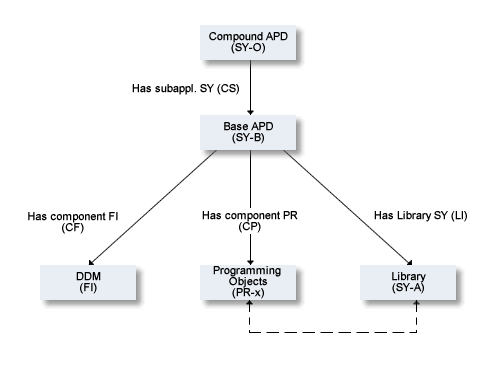Natural Development Server (NDV) stores the following information into Predict:
Structure of Application Descriptions (APD)
Locks
Notes:
This document covers the following topics:
The following NDV objects can be documented in Predict:
Base Applications Descriptions
Compound Applications Descriptions
Data Definition Modules
Natural Programming Objects
Libraries
Message files

The following table provides an overview of how different NDV objects are documented.
| Natural Development Server | Documented in Predict with |
|---|---|
| Base APD | System object of type B |
| Compound APD | System object of type O |
| DDM | File object |
| Natural Programming Objects | Program object of corresponding type |
| Library | System object of type A |
| Message file | Program object of type 2 |
Base Application Descriptions are documented as objects of type System with system type B. Base Application Descriptions have the following specific attributes:
Server name
Port
Profile name
Profile DBnr
Profile Fnr
For Base APDs the following specific associations exists:
"Has component FI" with association
code CF:
which Data Definition Modelues belongs to this Application
description.
"Has component PR" with association
code CP:
which Natural Programming Objects belongs to this Application
description.
"Has library SY" with association code
LI:
each library of Natural Programming Objects, that are linked to the
Base APD with association "Has component PR", must
be linked to the Base APD.
Note:
The association "Has library SY" is built
automatically when changing the association "Has component
PR".
Compound Application Descriptions are documented as objects of type System with system type O. Compound Application Descriptions have no specific attributes.
The association from Compound APD to Base APD is named "Has subappl. SY" with association code CS.
Note:
Predict Maintenance functions ensure that only Systems of system type
B are linked to Compound APDs.
Data Definition Modules are documented as objects of type File. The association from a Base APD to the Data Definition Modules is named "Has component FI" with association code CF.
Natural Programming Objects are documented as objects of type Program with corresponding program type.
The association from a Base APD to the Natural Programming Objects is named "Has component PR" with association code CP.
The following rules apply for Natural Programming Objects linked to a Base APD:
The implementation pointer must be full qualified.
All members must be on the same Natural System File.
For each Natural Programming Object the library this object is in must be documented as a System of system type A with the association "Has library SY" (association code LI).
If database number or file number of the implementation pointer is changed, the Natural Programming Object is removed from the Base APD. If it is also the last member with the library in this Base APD, the corresponding system type A, representing the library, must be removed from association "Has library SY" too.
Libraries are documented as objects of type System with system type A. The association from a Base APD to the libraries is named "Has library SY" with association code LI.